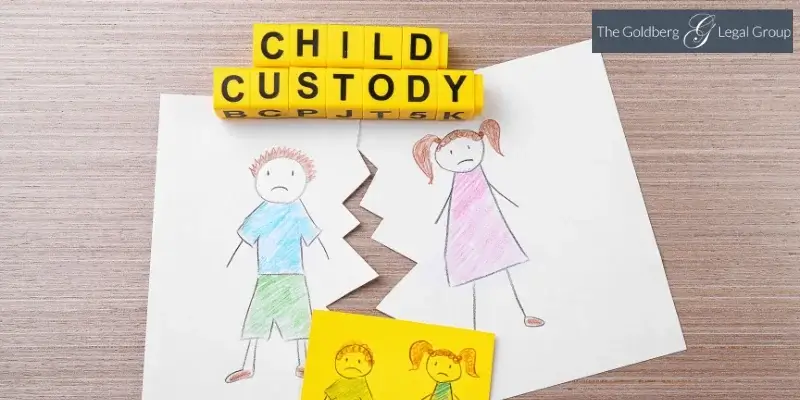Irvine Child Custody Lawyer
Legal proceedings for divorce can get extremely complex, especially if child custody is contested. If you and your spouse have filed for divorce, the matter of custody of the children can be resolved between you without needing to go to court. However, if the issue is unresolved, you will need to go to court.
In California, the children’s best interests are the court’s top priority when providing a judgment in custody cases. Child custody matters may require you to seek legal assistance by hiring an Irvine family law attorney. Continue reading to learn more about how our experienced Irvine child custody lawyers at The Goldberg Legal Group can help you with a child custody case in Irvine, CA.

How Can An Irvine Child Custody Attorney Help?
Legal, sole, physical, and joint custody all have different meanings. Being a legal custodian of your children means you can decide on the matters of their upbringing. Primary or physical custody implies that you are keeping the child with you. Sole custody does not require you to share custody with the other parent, but it still allows for visitation. Joint custody means that even though the parents do not live together, they share legal and physical custody of the children.
Custody hearings can be an emotional process for parents, so a reliable and experienced third party, such as a child custody attorney, can mediate the situation and ensure that you do not make an emotional decision that you may regret in the future. Having a law firm by your side can help you expedite the process and attain a favorable judgment in court.
An Irvine family law attorney can guide you through the best course of legal action depending on the facts of the case. They can inform you about all the legal proceedings and legal paperwork and help you prepare yourself for each step of the process. Ideally, you want to hire and consult an attorney for custody matters before filing the divorce petition in court. This will help maximize your interest in the custody case.
It will also give you enough time to analyze the facts of your case and your financial stability to obtain custody of your children. As mentioned earlier, California courts usually decide in the best interests of the children, so you need to show how you are a suitable parent or custodian of the child.
If you and your ex-spouse want to settle on a time-sharing agreement, an attorney can inform you about the factors that could make the court refuse the time-sharing agreement and give judgment for sole legal custody to your spouse. A lot of factors come into play, such as any history of family violence, financial situation, the willingness of the parent to allow visitation, and more.
Laws on Child Custody in Irvine, CA
The following are the California laws regarding child custody:
- Under California laws of child custody, the court can give the custody of the child or children to either one of the parents; however, joint legal custody is typically the preferred arrangement unless the court finds one parent unsuitable for custody. The custody can also be given to a suitable guardian who is not the child’s parent.
- Custody orders are common in cases that involve the dissolution of marriage(legal separation, divorce, annulment), parentage cases (the parents of the children or child are not bound by matrimony), and domestic violence cases (if one party has filed for a restraining order).
- The parent can file for a petition of custody regardless of being married or unmarried.
- The court orders both parents to devise a parenting plan and submit it to the court. In the plan, they establish the type of care (education, health, welfare, etc) they can provide to the children. If both or either parent fails to do so, they may go through a mediation process to resolve the issue before the case progresses.
- If mediation does not resolve the issue, the court can order federal agencies to conduct investigations and then give a judgment of custody based on the investigation report.
- Divorce matters can take a few weeks to several months. The Irvine courts allow either parent to seek temporary custody of their children, and the other non-custodial parent can request visitation orders. Temporary custody can significantly impact the judgment of permanent custody.
- California courts aim to provide children with maximum and frequent contact with both parents, provided that (if there are two or more children) the siblings can remain together unless one of them requires special care.
- Mothers are no longer considered the primary custodian of their children under the tender years’ doctrine principle in California courts, so the court makes the decision based on either the children’s preferences or their best interests.
- The court may or may not allow children of age 14 or above to testify and inform the court about their preferences regarding custody and visitation.
You can contact a certified family law specialist from the Goldberg Legal Group if you have specific questions regarding child custody law in Irvine, CA.
What to Expect in Your Child Custody Order?
It is not uncommon for ex-spouses to have disputes over the legal and physical custody of their children. This often leads to a trial, which can be a long and complex process. If neither parent is willing to reach an agreement regarding child custody or is stipulated with the court-ordered judgment, they are at risk of losing custody of their children.
An experienced Irvine child custody lawyer could help you prove to the judge that you are the best custodian of your child. Courts in Irvine, CA, often let the parents devise a parenting plan that includes details such as which parent would have custody of the children over vacations.
Irvine Child Custody Legal Issues
Parent’s Right to Sole Custody
Courts in Irvine, CA, often permit parents to make their own arrangements regarding child custody and determine whether or not either parent would prefer having sole custody of the children.
It is possible for both parents to reach an agreement out of court, but in legal proceedings such as divorce cases, these arrangements can be considered components of the divorce case. It is common for both spouses to get into dispute regarding sole custody, which would further the case into more trials until the court gives a judgment.
Children’s Best Interests and Preferences
If the parent wants to attain physical custody of the child, the child’s preferences might be an obstacle if the child prefers to spend more time with the ex-spouse. Children with a certain level of maturity who are over the age of 14 can be allowed by the court to testify about their preferences.
There can be several factors considered in child custody cases. The court may also review the physical and mental health of both parents and their financial situation to support the lifestyle of their children.
Rights of Physical Custody
Physical custody rights are very different from legal custody rights. If the parent does not have legal custody of the child, they cannot decide on their medical treatment, religion, discipline, or education. Physical custody can only reside with the children. If the legal custody is not awarded to the parent, they cannot make any decisions for the child on their behalf without the approval of the legal custodian of the child.
Impact of Third Party
If the physical or emotional health of the children is at risk while remaining in the household of either parent, the court may give custody to a reliable third party who is continuously involved in the children’s lives, such as their grandparents.
Moving to Another State
If the parent attains sole custody of the child, they may not be permitted by the court to relocate if that affects the visitation rights of the non-custodial parent. But they can request court approval for relocation.
Death of Custodial Parent
According to state laws, a parent is preferred when awarding custody of children after the death of the primary custodian. The parent can apply for a modification of the custody order, and the court might award the custody of the child to the parent after reviewing the application.
Mediation Process in Child Custody Proceedings
Child custody mediation is mandatory for both parents to attend. Mediation may be ordered by the court to help the parents reach an agreement. Either parent who fails to attend the mediation can be fined by a court in California and ordered to attend another mediation.
The custody hearings may not progress further unless both parents or the divorcing couple participate in the mediation. Either party that fails to participate can be denied by the court to attend any of the custody hearings. In California, children of age 14 or above might be allowed by the court to attend the mediation.
The court employs the mediator who conducts the process where both parties engage to discuss custody matters. The mediator cannot make any recommendations to the court regarding custody matters.
The mediator can also request the court to appoint an investigator to report the lifestyle of each parent before the court gives a judgment. If both parents fail to reach a middle ground or even a partial agreement, the final decision on child custody resides with the court.
Why You Need an Irvine Child Custody Lawyer?
Child custody matters can be complex, and if you are dealing with divorce proceedings on the other end, it can become a very prolonged process. Child custody judgments are given by the courts depending on several factors. The Irvine child custody lawyers of the Goldberg Legal Group are well-versed in the laws regarding child custody and will guide you on the best legal course of action for the best interest of you and your child.
Contact us today to schedule a free consultation.
Child Custody Client Reviews
I highly recommend David and his group! They were truly dedicated and stood by me through every step of my long case. They always listened, explained things clearly, and fought hard for what was best for me and my kids. Thanks to their hard work and care, I was able to win custody of my children, which means everything to me. They were professional, kind, and never gave up, even when things got tough. I always felt like they had my back. If you need a strong, caring, and reliable lawyer for a divorce or custody case, this is the person you want on your side. I’m very thankful for everything he did for my family. – Noah quick via Google Reviews
David Goldberg and his dedicated team have been my greatest asset in going through a tough divorce. I switched over to David from another attorney, gaining confidence through phone calls and his gracious support. It has been the best decision I have made. David is both aggressive and will fight hard for you and at the same time be compassionate and understand your needs. His experience shows in leading you and navigating you every step of the way. If you want legal expertise to guide you through a tough divorce I would definitely recommend David and his team. David and his team knew all the ins and outs and intricacies to get me through one of the toughest experiences in my life. I received a favorable outcome and am able to move forward with confidence. I am grateful for all his expertise and support and would recommend him and his team to anyone going through a tough divorce and custody battle. – Corey Saito via Google Reviews
The Goldberg Legal Group – Irvine, CA Office
7545 Irvine Center Dr Ste 200
Irvine, CA 92618
Call: 949-229-0229





